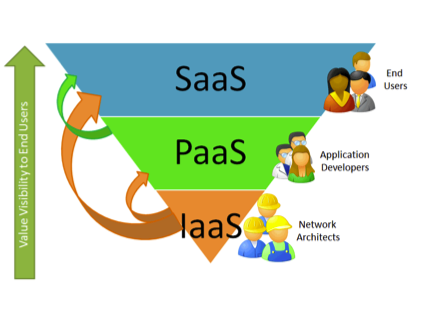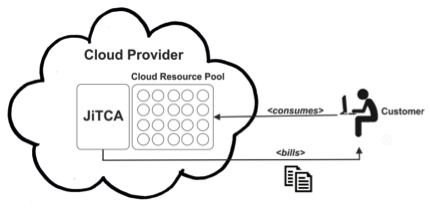My name is Francisco Airton, I am a Masters graduate student and this post aims at giving an introductory view of my master degree research at Centro de Informática (UFPE, Brazil), titled “JiTCA: An Accounting Framework for Federated Clouds”.

Cloud Computing has become an established paradigm for running services on external infrastructure, where virtually unlimited capacity can be dynamically allocated. This paradigm provides a new scenario for the deployment of applications and IT services. In such a model, as complete applications as infrastructure of machines are offered to users and charged only for the consumed resources. Thus, the Cloud resources are offered through service abstractions, which today are known three main categories: Software as a Service (SaaS), Platform as a Service (PaaS) and Infrastructure as a Service (IaaS).
In the IaaS case, computing resources are offered as Virtual Machines for final customers. Aiming to achieve the unlimited resources aspect of cloud is necessary to distribute these Virtual Machines through multiple Data Centers. This distribution makes harnessing to fulfil a number of requirements such as Security, Reliability, Availability and Accounting for the consumed resources.
The Accounting function refers to how resources are recorded and charged, or more formally described:
Accounting is “the art of recording, classifying, and summarizing in a significant manner and in terms of money, transactions and events which are, in part at least, of financial character, and interpreting the results thereof “ (Wahla, 1941)
It is important to highlight that regarding Cloud Computing the term broadly used to refer such area is Billing, however recent studies established that the entire process from recording usage to the payment of consumed resources is in fact Accounting (Ruiz-Agundez, 2010).
So, even in the case of a single cloud provider this task of Accounting is hard and there is a context which it becomes even worse, known as the Federation of Cloud Computing or also called Federated Cloud. Federated Cloud happens when a cloud provider dynamically outsource resources to other providers in response to demand variation.

To better clarify Federated Cloud, imagine joining IaaS resources from different providers such as Amazon, GoGrid or Rackspace and you as a final user pay less money due to the possible intelligent scheduling, or even more simple, imagine Data Centers installed under several universities partnering with each other and offering such pool of resources for the students. That’s right, this is Federated Cloud.
Thus, there is a cluster of clouds, but their resources are heterogeneous, resulting in a greater effort to manage the distributed resources and consequently for the Accounting. In this context, it was identified some research addressing this area which developed platforms for Federated Clouds, however without addressing the Accounting requirement.
My work presents the JiTCA, an accounting framework which objective is charge Infrastructure as a Service with focus on Federated Cloud. In order to gather information and consequently generate guidelines to substantiate decisions in building the framework, we applied a Systematic Mapping Study. In summary a Systematic Mapping Study provides an overview of a research area, and identifies results available within it.

Among the main functionalities are: a Domain Specific Language to specify charging policies (a kind of formula to calculate how much the customers are going to pay); Service Level Agreement Support; and Pre/Post-Paid Models Support.
Finally, the framework was evaluated through an experimental study, showing evidences that the requirements generated by the Mapping Study were fulfilled by the framework and presenting indicators of its viability in a real Federated Cloud Platform called JiTCloud. The JiTCloud is a result from the research which involved eighteen Brazilian universities, sponsored by the _Centro de Pesquisa e Desenvolvimento em Tecnologias Digitais para Informação e Comunicação _(CTIC). Its proposal addresses an alternative to build computational infrastructure to support cloud computing which is not based on traditional capacity planning.
If you want to know more about this research access: http://cin.ufpe.br/~faps/jitca